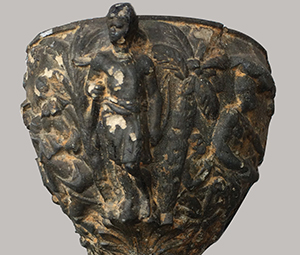PEWTER CUP
Published in Issue 4 (July/August 2021), Letters, Volume 29 Sir,—I know that History Ireland is not the Antiques Road Show, but perhaps your magazine could, through your letters page, ask its readers about this pewter cup (210mm high and 13mm wide). It was found in 1961 in the River Corrib as it leaves Galway. The images seem to show a foreign battle and African figures. It may be a souvenir of some colonial conflict and an heirloom belonging to an Irish person involved in the British colonial service. Is the pewter cup artefactual testimony to Ireland’s role in the British colonies?—Yours etc.,
Sir,—I know that History Ireland is not the Antiques Road Show, but perhaps your magazine could, through your letters page, ask its readers about this pewter cup (210mm high and 13mm wide). It was found in 1961 in the River Corrib as it leaves Galway. The images seem to show a foreign battle and African figures. It may be a souvenir of some colonial conflict and an heirloom belonging to an Irish person involved in the British colonial service. Is the pewter cup artefactual testimony to Ireland’s role in the British colonies?—Yours etc.,
MATTHEW STOUT
matthew.stout@dcu.ie
'
















